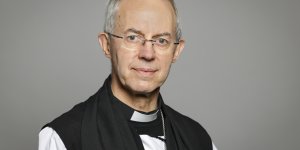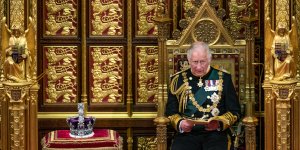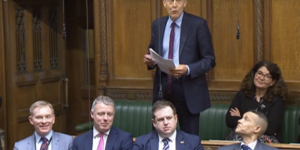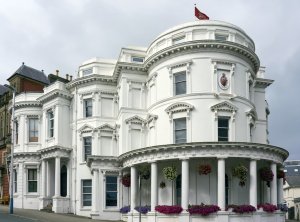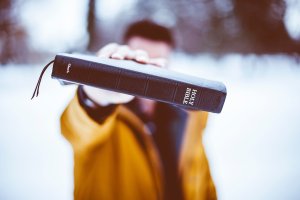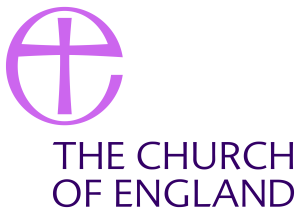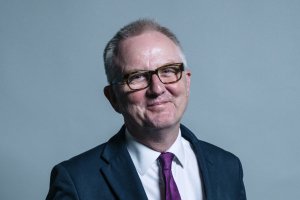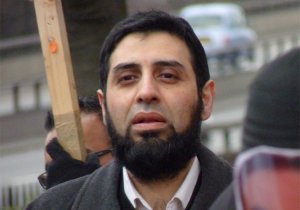Rethinking religion and belief in public life: a manifesto for change
The time has come to rethink religion's public role in order to ensure equality and fairness for believers and non-believers alike, says a major new report launched by the National Secular Society.
The report says that Britain's "drift away from Christianity" coupled with the rise in minority religions and increasing non-religiosity demands a "long term, sustainable settlement on the relationship between religion and the state".
Rethinking religion and belief in public life: a manifesto for change has been sent to all MPs as part of a major drive by the Society to encourage policymakers and citizens of all faiths and none to find common cause in promoting principles of secularism.
It calls for Britain to evolve into a secular democracy with a clear separation between religion and state and criticises the prevailing multi-faithist approach as being "at odds with the increasing religious indifference" in Britain.
Terry Sanderson, National Secular Society president, said: "Vast swathes of the population are simply not interested in religion, it doesn't play a part in their lives, but the state refuses to recognise this.
"Britain is now one of the most religiously diverse and, at the same time, non-religious nations in the world. Rather than burying its head in the sand, the state needs to respond to these fundamental cultural changes. Our report sets out constructive and specific proposals to fundamentally reform the role of religion in public life to ensure that every citizen can be treated fairly and valued equally, irrespective of their religious outlook."
Read the report:
Rethinking religion and belief in public life: a manifesto for change
Add your endorsement to the manifesto for change
Add your endorsementComplete list of recommendations
Our changing society – Multiculturalism, secularism and group identity
1. The Government should continue to move away from multiculturalism and instead emphasise individual rights and social cohesion. A multi-faith approach should be avoided.
2. The UK is a secularised society which upholds freedom of and from religion. We urge politicians to consider this, and refrain from using "Christian country" rhetoric.
The role of religion in schools
Faith schools
3. There should be a moratorium on the opening of any new publicly funded faith schools.
4. Government policy should ultimately move towards a truly inclusive secular education system in which religious organisations play no formal role in the state education system.
5. Religion should be approached in schools like politics: with neutrality, in a way that informs impartially and does not teach views.
6. Ultimately, no publicly funded school should be statutorily permitted, as they currently are, to promote a particular religious position or seek to inculcate pupils into a particular faith.
7. In the meantime, pupils should have a statutory entitlement to education in a non-religiously affiliated school.
8. No publicly funded school should be permitted to prioritise pupils in admissions on the basis of baptism, religious affiliation or the religious activities of a child's parent(s).
9. Schools should not be able to discriminate against staff on the basis of religion or belief, sexual orientation or any other protected characteristics.
Religious education
10. Faith schools should lose their ability to teach about religion from their own exclusive viewpoint and the law should be amended to reflect this.
11. The Government should undertake a review of Religious Education with a view to reforming the way religion and belief is taught in all schools.
12. The teaching of religion should not be prioritised over the teaching of non-religious worldviews, and secular philosophical approaches.
13. The Government should consider making religion and belief education a constituent part of another area of the curriculum or consider a new national subject for all pupils that ensures all pupils study of a broad range of religious and non-religious worldviews, possibly including basic philosophy.
14. The way in which the RE curriculum is constructed by Standing Advisory Councils on Religious Education (SACREs) is unique, and seriously outdated. The construction and content of any subject covering religion or belief should be determined by the same process as other subjects after consultation with teachers, subject communities, academics, employers, higher education institutions and other interested parties (who should have no undue influence or veto).
Sex and relationships education
15. All children and young people, including pupils at faith schools, should have a statutory entitlement to impartial and age-appropriate sex and relationships education, from which they cannot be withdrawn.
Collective worship
16. The legal requirement on schools to provide Collective Worship should be abolished.
17. The Equality Act exception related to school worship should be repealed. Schools should be under a duty to ensure that all aspects of the school day are inclusive.
18. Both the law and guidance should be clear that under no circumstances should pupils be compelled to worship and children's right to religious freedom should be fully respected by all schools.
19. Where schools do hold acts of worship pupils should themselves be free to choose not to take part.
20. If there are concerns that the abolition of the duty to provide collective worship would signal the end of assemblies, the Government may wish to consider replacing the requirement to provide worship with a requirement to hold inclusive assemblies that further pupils' 'spiritual, moral, social and cultural education'.
Independent schooling
21. All schools should be registered with the Department for Education and as a condition of registration must meet standards set out in regulations.
22. Government must ensure that councils are identifying suspected illegal, unregistered religious schools so that Ofsted can inspect them. The state must have an accurate register of where every child is being educated.
Freedom of expression - Freedom of expression, blasphemy and the media
23. Any judicial or administrative attempt to further restrict free expression on the grounds of 'combatting extremism' should be resisted. Threatening behaviour and incitement to violence is already prohibited by law. Further measures would be an illiberal restriction of others' right to freedom of expression. They are also likely to be counterproductive by insulating extremist views from the most effective deterrents: counterargument and criticism.
24. Proscriptions of "blasphemy" must not be introduced by stealth, legislation, fear or on the spurious grounds of 'offence'. There can be no right to be protected from offence in an open and free secular society.
25. The fundamental value of free speech should be instilled throughout the education system and in all schools.
26. Universities and other further education bodies should be reminded of their statutory obligations to protect freedom of expression under the Education (No 2) Act 1986.
Religion and the law
Civil rights, 'conscience clauses' and religious freedom
27. We are opposed in principle to the creation of a 'conscience clause' which would permit discrimination against (primarily) LGBT people. This is of particular concern in Northern Ireland.
28. Religious freedom must not be taken to mean or include a right to discriminate. Businesses providing goods and services, regardless of owners' religious views, must obey the law.
29. Equality legislation must not be rolled back in order to appease a minority of religious believers whose views are out-of-touch with the majority of the general public and their co-religionists.
30. The UK Government should impose changes on the rest of the UK in order to comply with Human Rights obligations. Every endeavour should be made by to extend same sex marriage and abortion access to Northern Ireland.
Conscience 'opt-outs' in healthcare
31. Efforts to unreasonably extend the legal concept of 'reasonable accommodation' and conscience to give greater protection in healthcare to those expressing a (normally religious) objection should be resisted.
32. Conscience opt-outs should not be granted where their operation impinges adversely on the rights of others.
33. Pharmacists' codes should not permit conscience opts out for pharmacists that result in denial of service, as this may cause harm. NHS contracts should reflect this.
34. Consideration should be given to legislative changes to enforce the changes to pharmacists codes recommended above.
The use of tribunals by religious minorities
35. The legal system must not be undermined. Action must be taken to ensure that none of the councils currently in operation misrepresent themselves as sources of legal authority.
36. Work should be undertaken by local authorities to identify sharia councils, and official figures should be made available to measure the number of sharia councils in the UK to help understand the extent of their influence.
37. There needs to be a continuing review by the Government of the extent to which religious 'law', including religious marriage without civil marriage, is undermining human rights and/or becoming de facto law. The Government must be proactive in proposing solutions to ensure all citizens are able to access their legal rights.
38. All schools should promote understanding of citizenship and legal rights under UK law so that people – particularly Muslim women and girls – are aware of and able to access their legal rights and do not regard religious 'courts' as sources of genuine legal authority.
Religious exemptions from animal welfare laws
39. Laws intended to minimise animal suffering should not be the subject of religious exemptions. Non-stun slaughter should be prohibited and existing welfare at slaughter legislation should apply without exception.
40. For as long as non-stun slaughter is permitted, all meat and meat products derived from animals killed under the religious exemption should be obliged to show the method of slaughter.
41. In public institutions it should be unlawful not to provide a stunned alternative to non-stun meat produce.
Religion and public services
Social action by religious organisations
42. The Equality Act should be amended to suspend the exemptions for religious groups when they are working under public contract on behalf of the state.
43. Legislation should be introduced so that contractors delivering general public services on behalf of a public authority are defined as public authorities explicitly for those activities, making them subject to the Human Rights Act legislation.
44. It should be mandatory for all contracts with religious providers of publicly-funded services to have unambiguous equality, non-discrimination and non-proselytising clauses in them.
45. Public records of contracts with religious groups should be maintained and appropriate measures for monitoring their compliance with equality and human rights legislation should be put in place.
46. There should be an enforcement mechanism for the above, which would for example receive and adjudicate on complaints without complainants having to take legal action.
Hospital chaplaincy
47. Religious care should not be funded through NHS budgets.
48. No NHS post should be conditional on the patronage of religious authorities, nor subject directly or indirectly to discriminatory provisions, for example on sexual orientation or marital status.
49. Alternative funding, such as via a charitable trust, could be explored if religions wish to retain their representation in hospitals.
50. Hospitals wishing to employ staff to provide pastoral, emotional and spiritual care for patients, families and staff should do so within a secular context.
Institutions and public ceremonies
Disestablishment
51. The Church of England should be disestablished
52. The Bishops' Bench should be removed from the House of Lords. Any future Second Chamber should have no representation for religion whether ex-officio or appointed, whether of Christian denominations or any other faith. This does not amount to a ban on clerics; they would eligible for selection on the same basis as others.
Remembrance
53. The Remembrance Day commemoration ceremony at the Cenotaph should become secular in character. Ceremonies should be led by national or civic leaders and there should be a period of silence for participants to remember the fallen in their own way, be that religious or not.
Monarchy and religion
54. The ceremony to mark the accession of a new head of state should take place in the seat of representative secular democracy, such as in Westminster Hall and should not be religious.
55. The monarch should no longer be required to be in communion with the Church of England nor ex officio be Supreme Governor of the Church of England, and the title "Defender of the Faith" should not be retained.
Parliamentary prayers
56. We believe Parliament should reflect the country as it is today and remove acts of worship from the formal business of the House.
Local democracy and religious observance
57. Acts of religious worship should play no part in the formal business of parliamentary or local authority meetings.
Public broadcasting, the BBC and religion
58. The BBC should rename Thought for the Day 'Religious thought for the day' and move it away from Radio 4's flagship news programme and into a more suitable timeslot reflecting its niche status. Alternatively it could reform it and open it up to non-religious contributors.
59. The extent and nature of religious programming should reflect the religion and belief demographics of the UK.
Add your endorsement to the manifesto for change
Add your endorsementThe 2017 General Election
House of Lords makes politicians out of prelates
Religious leaders should be free to speak out on matters that concern them, but they should do so on the basis of equality, not privilege, argues Stephen Evans.
Justin Welby's recent intervention in the House of Lords debate on the Illegal Migration Bill has sparked much discussion about whether religion and politics should mix.
The archbishop of Canterbury attacked the government's legislation to stop small boat crossings (amongst other things) as "morally unacceptable". Referencing the Bible, he pointed out that Jesus taught us to "welcome the stranger".
Welby's speech provoked a predictable backlash from supporters of the bill. Conservative MP and member of the Home Affairs committee James Daly said: "The unelected archbishop should stick to religion and keep out of politics". Telegraph columnist Allison Pearson was so angry she said she could "cheerfully bop the nitwit on the mitre". Former cabinet minister Lord Forsyth suggested the archbishop should concern himself with "issues spiritual, rather than temporal."
But the fact is Welby is one of 26 bishops of the Church of England given seats as of right as lawmakers in our upper chamber. Their role as members of the 'lords spiritual' gives them direct influence in the secular realm of legislating, making politicians out of prelates.
Whether or not you agree with Welby on this issue, the archaic and unjustifiable arrangement that inserts Anglican clerics into our legislature needs to be addressed. It turns our parliament into a pulpit from which bishops can pontificate on any issues they choose – often in a self-serving way. For example, by imposing their theology through opposition to assisted dying or same sex marriage, or by promoting the use of publicly funded schools for proselytism.
Civil society groups, religious and secular, should be free to speak out on issues that concern them. But there's no good reason why Church of England clerics should uniquely enjoy a privileged platform in parliament to do so.
With the media focussing almost exclusively on the archbishop's intervention, you'd be forgiven for not noticing that scores of other members of the House of Lords lined up to voice strong opposition to the Illegal Immigration Bill, too – along with a coalition of 176 civil society organisations who called on parliamentarians to urge the government to immediately withdraw it.
The bizarre focus on a church leader finding government legislation "morally unacceptable" suggests we still believe a bishop's opinions carry greater moral weight that anyone else's. The idea that religious leaders have access to moral insights denied to the rest of us is as offensive as it is outdated. In the case of most organised religions, it is also demonstrably false.
It's this same outmoded and prejudiced attitude that keeps BBC Radio 4's 'Thought for the Day' ringfenced for religious ideas, Christian worship mandated at the start of school days, and prayers before parliamentary sittings.
Clerics in the legislature, like the heads of state's Christian coronation, is a medieval tradition that sits uneasily in a 21st century pluralistic secular democracy.
Constitutional reforms have often struggled to gain political saliency in modern Britain, but the Labour Party's next manifesto looks set to include plans to abolish the House of Lords, which would automatically take the bishops with it.
When we do finally get around to reforming our second chamber, explicit religious representation shouldn't feature. Practicalities aside, extending Anglican privilege to more faith and belief groups would simply fuel division and neglect the nonreligious and religiously unconcerned. Religious privilege should be ended, not extended.
But Justin Welby and other faith leaders are perfectly entitled to join other civil society organisations in trying to persuade decision-makers to hear and understand their point of view. It's a free country. But there's no reason to give them a privileged pedestal from which to do so.
Image: Roger Harris, CC BY 3.0
The coronation isn’t for us. It’s for the Church.
As King Charles' coronation approaches, Megan Manson says we must stop letting the Church using our affairs of state to promote itself.
A coronation fit for a king, not a modern democracy
An exclusively Anglican religious ritual is no way to inaugurate a head of state in diverse Britain, argues Stephen Evans.
Whether in a republic, or in a constitutional monarchy like the UK, the investiture of a head plays an important role. It forms and reflects a nation's identity and can provide for a rare 'unifying moment' for all its citizens.
It is therefore regrettable that the crowning of King Charles will happen as part of an exclusively Anglican religious ritual.
It's long been thought that the upcoming coronation will be a more multifaith affair than the previous one. But this was always going to be a tall order. King Charles might have desired a more 'diverse' ceremony, but the Church of England had other ideas.
So, it seems the role of other faiths will be limited to performative subservience – Muslim, Hindu, Sikh and Jewish peers presenting the king with various bits and bobs of coronation regalia.
According to reports, Baroness Merron, a Jewish peer and former Labour MP, will bring the king one of the coronation robes. Lord Patel, a Hindu crossbench peer, will carry the sovereign's ring. Lord Kamall, a Muslim Conservative peer, will bring some bracelets. And Lord Singh, a Sikh crossbench peer, will bring him a glove.
Clerics from other faiths will form part of a "faith procession" but won't be asked to give any readings or blessings.
Such tokenistic gestures are a poor substitute for genuine inclusivity. The plans demean other faiths and – as is so often the case with multifaithism – completely neglect the nonreligious and religiously unconcerned.
This coronation, like all others, is intended to project and entrench Anglican supremacism and privilege. That's the whole point. The rest is window dressing.
The archbishop of Canterbury will be the one to place the solid gold crown on the king's head. Away from the public's gaze, he will anoint our head of state with holy oil, a part of the ceremony echoing the divine right of kings. The king will swear oaths to defend the Church of England's privileges and doctrine.
The whole affair is positively medieval and deeply anti-secular.
The coronation will not only seem outdated to many, within the context of modern Britain. It will also be inaccessible to many in terms of what it seeks to represent. The archbishop is understood to be giving the king 'religious guidance' on the theological significance of all of this, but many of us are likely to be suitably bemused and alienated.
The Church of England regards the coronation as a "unique missional opportunity". But the danger to monarchy is that the optics of a religious coronation will render it as irrelevant as the CofE is to many Brits. This is especially true of younger people, who regard the Church as out of touch on social issues such as same sex marriage and gay sex which are still regarded as sinful by the CofE. Recent polling found that 78% of those aged 18-24 aren't interested in the royal family. Just 3% of the same cohort describe themselves as Anglican.
Despite being an exclusively Anglican ritual and legally unnecessary, the coronation will be paid for by the UK government using taxpayer money – a situation not supported by more than half of Britons. The National Secular Society's freedom of information request as to the expected cost was met with a refusal to disclose by the UK government, but estimates suggest it will run to many tens of millions of pounds. Against the backdrop of the Church and the monarch's substantial wealth, Graham Smith of Republic has described the state funding of the coronation as a "slap in the face" for people struggling with the cost-of-living crisis.
Regardless of whether individuals support the idea of monarchy or not, a head of state's official accession should be inclusive and representative of the heterogeneous state they will be heading. A wholly Anglican coronation service is no longer capable of reflecting or responding to modern British society.
Many will no doubt be seduced by the spectacle of the coronation. The status quo and tradition will be defended by those who subscribe to British exceptionalism and quite like the idea of the UK still being a Christian country, including some minority faith leaders who benefit from the leg up that Anglican establishment can provide.
But King Charles is no champion of religious freedom. A genuine commitment to this important principle is inconsistent with the role of head of state being reserved exclusively for practising Christians. The monarch's religious titles of 'defender of the faith' and 'supreme governor of the Church of England' are underpinned by an assumption that all future monarchs will be believing Anglicans. This is statistically unlikely and runs counter to the concept of freedom of religion or belief.
The coronation exists to assert the Church of England's supremacy over the constitution, the monarchy, the state and its citizens. It's the ultimate privilege from which all other religious privileges flow.
A global audience will tune in to watch a ghost of what the UK once was, rather than what it has become. They may well marvel at the pomp and pageantry, but I bet they'd take equality and democracy over inherited power and religious privilege for themselves.
The role of head of state in a 21st century democracy should not operate like this. It betrays everything modern Britain should stand for. This coronation should be the last. And then the work to separate church and state should begin.
Hospital chaplains: unfair, unevidenced, unnecessary?
NSS research shows the NHS significantly cut real-terms chaplaincy spending between 2009 and 2021. This is a step in the right direction – but £29m a year is still far too much to be forking out on a religious service, argues Dr Alejandro Sanchez.
National Secular Society research has found that in 2020/21, the NHS spent £29.7m on chaplaincy. In absolute terms this is not dissimilar from the £29m spend in 2009/2010. When adjusted for inflation, however, this represents a 20.3% real-terms cut.
It would seem the NHS has deprioritised funding for chaplaincy – and this is no bad thing.
A new report from the Nuffield Trust says public satisfaction with the NHS has slumped to its lowest level ever since surveys began in 1983. Waiting times, staff shortages and inadequate funding are the top sources of dissatisfaction. Increasing NHS staff, making it easier to get GP appointments and improving waiting times for operations should be the top priorities, according to about half of those surveyed. There are several other priority areas identified, but chaplaincy, or even general pastoral care, are not among them.
The NSS has long questioned the wisdom of using the already over-stretched NHS budget on providing a religion-specific service with contestable health benefits. We don't deny that providing spiritual and pastoral care to patients is deeply compassionate act which brings comfort to people at their lowest. But when the NHS is struggling more than ever, is it justifiable to continue spending millions on what's first and foremost a religious activity?
Unfair
In 2020/21, the NHS employed 910 chaplains. Of the 460 that data was available for, over 78% were Christian. This is entirely incongruous with last year's census data which revealed England and Wales are minority Christian countries for the first time. If the NHS is to employ chaplains, it should, at the very least, ensure that they are representative of the population they minister to.
The overrepresentation of Christian chaplains comes as no surprise when one examines how chaplaincy roles are advertised. A 2020 report by the Network for Pastoral, Spiritual, and Religious Care in Health found Christian chaplains enjoy "unfair advantages", including job specifications that use Christian criteria such as "ordination and endorsement from a Christian authorising body." No wonder then that the Church of England was the only faith group to reject the findings of the report.
Unevidenced
There is no compelling evidence that spending more on chaplains results in better outcomes for patients. Previous NSS research examined whether NHS trusts that spent more on chaplaincy had better results as measured by two benchmarks. No statistically significant relationship was established between higher chaplaincy spend and either mortality rates or 'Standards for Better Health' – a measure of quality of service and use of resources. The report concluded that chaplaincy spending could be cut by £18m without detriment to patient outcomes.
With the NHS on its knees and staff morale at all-time lows, surely the system would benefit by reallocating the chaplaincy budget to employ over 1,000 more junior nurses. And the notion that junior chaplains may be paid £9,000 more than newly registered nurses cannot be right.
Unnecessary
The key attribute of any successful hospital chaplain is the ability to empathise with and relate to the patient in front of them. They must provide support to the patient in their hour of need in a friendly and non-judgemental way. Religiosity is in no way a pre-requisite of these skills.
In 2020, an Catholic NHS chaplain was accused of telling a gay patient he "should not be with his husband" and he "would go to hell". After his contract was ended for budgetary reasons, the chaplain in question said the NHS "were not prepared to tolerate having a chaplain on site who would not affirm what the Catholic church teaches to be a sin."
Furthermore, a 'Caring for the Hindu patient' leaflet, produced by the chaplaincy section of Frimley Health NHS Foundation Trust, perpetuates hierarchical and discriminatory aspects of the Hindu caste system. It describes the Harijan caste as "the lowest Hindu caste (untouchables). Menstruating women and mourners can be seen as ritually unclean and therefore untouchable." By contrast, the Brahmin are the "highest Hindu caste".
While I am in no way suggesting that all chaplains foist religious dogma upon their patients, these cases certainly serve as a cautionary tale of the risk in mixing faith and healthcare.
What's perhaps even more disturbing is that chaplaincy opens the doors for those with more sinister agendas – such as Jehovah's Witness elders who want to ensure members of their congregation who happen to be hospitalised don't receive a blood transfusion, even if this means death.
In an increasingly diverse and irreligious society such as ours, it makes little sense to organise patients' pastoral care around religious identities. While it should remain the prerogative of religious groups themselves to fund religious care, the appointment of NHS pastoral support staff must become separate from the religious affiliation of the applicant. When considering how to reform the NHS for greater fairness, effectiveness and best use of limited public funds, chaplaincy must be one area up for review.
Special thanks to Dominic Wirdnam and Tom Shaw for their research into chaplaincy spending in the NHS.
Why are safeguarding experts fleeing the Catholic Church?
Experts appointed to tackle abuse in the Catholic Church are quitting their roles. Keith Porteous Wood says this demonstrates the dire mess the Church is in – and that justice can only be secured if secular authorities play their part in holding the Church to account.
Professor Hans Zollner, regarded as "one of the greatest experts" on clerical abuse in the Catholic Church and an "ambassador for safeguarding", has resigned from the Pontifical Commission for the Protection of Minors, despite his term of office still having two years to run.
This Commission was set up to advise the Pope on "the most opportune initiatives for protecting minors and vulnerable adults" and "to promote local responsibility in the particular churches".
Zollner (pictured) was appointed in 2014 by the Pope as one of the Commission's founding members. He resigned over concerns about the Commission's "responsibility, compliance, accountability and transparency" which every church institution, "let alone the [Commission], is bound to uphold." He also described the financial responsibility and accountability as "inadequate", saying it was "crucial that the Commission clearly show the use of funds in its work".
To the fury of the Commission's president Cardinal O'Malley, Zollner also went so far as to announce that he wanted to disassociate himself from the Commission because of urgent "structural and practical issues" including the Pope's decision to make the Commission subservient to the Dicastery for the Doctrine of the Faith (DDF), formerly known as the Inquisition. The NSS has criticised the DDF's dubious role over safeguarding over many decades.
Baroness Hollins, who herself has resigned from the Commission, also criticised the DDF move. She considers it "anomalous to put safeguarding commission into the department that deals with allegations against priests given that its brief is to prevent abuse and to address the care and healing of victims/survivors."
Zollner said in his parting statement: "The protection of children and vulnerable persons must be at the heart of the Catholic Church's mission.
"That was the hope I and many others have shared since the commission was first established."
That he uses the past tense suggests he no longer thinks that this role is fulfilled by the Commission, or indeed by the Church as a whole.
That is a view we have long held. If the Church and the Pope took safeguarding seriously, the Pontifical Commission would be a gold standard. Instead it is a laughing stock.
The two abuse victims who were appointed at its inception have long since resigned in disillusionment, or worse. One "in protest" because "there was no collaboration with the Vatican".
The other, Peter Saunders, told me that the Pope showed no interest in the Commission whatsoever. On one day it sat, the Pope spent the whole day observing coffins being filed past him as some sort of commemoration, rather than attend the Commission's deliberations.
More recently there have been reports of the Commission running out of money so it could operate only on a skeleton basis, although the Vatican is known to have great wealth. Surely the Pope of all people would be the first to access to these funds, if he had the slightest interest in doing so. But on past performance, I doubt he has.
Instead the Commission has had to resort to hand outs from the Italian Bishops Conference. This body refuses all calls to institute a comprehensive independent inquiry of clerical abuse in Italy. It would be naïve to believe that their money will come without strings attached. It is not difficult to see why Zollner has thrown in the towel.
Baroness Hollins described Zollner "as a man of integrity [who] tells it how it is." In the whole of the Catholic Church, Zollner has been the only person of influence I have trusted during my work on clerical abuse of minors and he knew only too well of the many shortcomings, but had no power to even start to remedy them.
So where does that leave the Church on clerical abuse? In my view, incapable and unwilling to police itself on clerical abuse or to compensate victims fairly. It is a worldwide institution where criminality is endemic. And all too often civil authorities, even for example in supposedly secular France, give Church criminality a free pass.
The root cause of such abuse is the unchallengeable power of the hierarchy, or "clericalism". Pope Francis also accepts this, but is doing little if anything to limit it.
The most extreme example of this clericalism has been the hierarchy's refusal, on Francis' watch and presumably therefore with his agreement, to uphold the Vatican's obligations under the UN Convention of the Rights of the Child beyond the confines of the minuscule Vatican City State. It does so on the disingenuous pretext that it lacks the "capacity or legal obligation to impose the [obligations of the Convention] upon the local Catholic churches and institutions present on the territory of other States", despite the Pope's absolute power to appoint and dismiss bishops at will.
So, we have this massive worldwide organisation that is a law unto itself in which inquiry after inquiry confirms that sexual abuse of minors and vulnerable adults continues on a significant scale.
The only hope I can see of any improvements from within come from the growing calls for "synodality", for the laity to play a much greater role church governance, thereby limiting clericalism. The Church in Germany is leading the way on this and even considering changes to doctrine on homosexuality and celibacy in defiance of the Vatican. The synodical movement has been fuelled in part by the need to find a way to reverse the fast-emptying pews. But for such a movement to take hold on a significant proportion of the church will take decades or centuries.
So how else abuse in the church be tackled? There must be action from those outside the Church, as well as within.
First, the public and media can put pressure on state's justice and police to act decisively, without deference to religion, in rooting out abuse. This includes calling for independent state lawyer-led inquiries into clerical abuse, and NGOs submitting evidence to the Committee on the Rights of the Child about abuse on a country by country basis. NGOs should also publicise their findings to put pressure on member states to remedy shortfalls in their response to clerical abuse.
Second, statutes of limitation on criminal abuse and civil claims must be maximised or eliminated. This was one of the recommendations made by the Independent Inquiry into Child Sexual Abuse in England last year.
Finally, we must ensure that every state has a well-designed mandatory reporting law for abuse of minors that carries a criminal sanction.
We may already be seeing progress on the last point. Just last week, the home secretary announced a plan to introduce a legal requirement to report child sexual abuse in England. We'll be scrutinising these plans to ensure they are effective and do not make any concessions to religion – for example, it is crucial that, as in Australia, there are no exemptions for disclosure in the confessional.
What's more, the massive publicity over clerical abuse over many decades has reduced clerics' overbearing power over minors. Abusers any longer take it for granted that victims' accusations will not be believed.
There is still a long way to go to secure justice for victims and survivors of abuse in the Catholic Church. But as these developments demonstrate, pressure must come from states and the United Nations, as little can be expected from the Church.
Homophobic churches and liberal states make for unhappy bedfellows
Parliament should begin the process of disestablishment rather than try to fix the Church of England, argues Stephen Evans.
A recent exchange in parliament revealed the incongruity of a state church in a liberal democracy.
Last week, a group of respected parliamentarians brought forward a bill to allow for same sex marriage in the Church of England. Unlike other religious organisations, the Church of England is explicitly banned from holding same sex marriages by parliament. This arrangement was part of a 'quadruple lock' to protect the Church from potential legal challenges when same sex marriage was legalised. This was felt necessary because, again, unlike other religious organisations, the CofE is legally obliged to marry all those who reside within a parish. There was clearly a tension between this duty and its opposition to same sex marriage.
The Same Sex Marriage (Church of England) Bill would simply enable CofE clergy to conduct same sex marriages on Church of England premises, if they choose to do so, without breaking the law of the land. This would clearly advance the religious freedom of Anglicans who support same sex marriage and see no conflict between that and their faith. The CofE's official doctrine would remain its own affair. On that basis, this is a bill worthy of support.
But by Ben Bradshaw's own admission, the intent behind the legislation is to nudge the CofE in the direction that the bills proposers want it to go. The Church's established status is being used as leverage to get the Church to adopt a more inclusive doctrine, consistent with the parliamentarians' own worldview.
This is legitimatised by virtue of the Church being established by parliament and subservient to it.
But it's this archaic arrangement that parliament ought to address, rather that the Church's doctrine. Establishment strikes at heart of the enlightenment principles of separation of church and state and freedom of religion or belief.
Prejudice against homosexuals is no longer socially acceptable in modern Britain. Religious organisations that display such prejudice are increasingly experiencing pushback when they interact with the state, through public funding or service provision such as the running of schools. Quite right, too. Attempts to impose homophobic doctrine with public money shouldn't be tolerated.
The Church of England's problem is that it doesn't just interact with the state, it's part of it. Our head of state is its Supreme Governor; its bishops are appointed by the monarch on the advice of the Prime Minister and enjoy seats as of right as lawmakers in the House of Lords. It runs thousands of state funded schools.
Speaking in support of his bill, Ben Bradshaw said with the privileges of establishment "comes a duty to serve all citizens equally".
The secular state should absolutely serve all citizens equally, but is that a realistic expectation for religious organisations with a doctrine to uphold? Bradshaw's view echoes the Church of England's own untenable vision it has for itself as being a "Church for the whole nation".
Those days over. The concept of a state church in a nation characterised by its religious, racial and sexual diversity is absurd.
The Church of England is in the business of 'proclaiming the good news of Jesus Christ'. That's fine for those that want it, but it isn't a mission that accords with vast swathes of the British public.
According to the 2021 census, the number of us ticking the Christian box has fallen to less than 48%. The proportion of the population identifying as Anglican is down to just 12%. Fewer than 1% of the population attend Anglican services on any given Sunday. And 52% of the public say they do not regard themselves as belonging to any religion.
We're clearly not a Christian Country. The case for dismantling the CofE's relationship with the state is now overwhelming. Parliamentarians would do well to acknowledge this and establish a commission to untangle the ties that bind.
For the time being, such an untethering isn't something most within the Church are keen to contemplate. Particularly the bishops who enjoy the power and prestige that establishment brings. But perhaps they could be persuaded.
Opposing Bradshaw's bill, Andrew Selous MP, who represents the CofE in parliament, gave the impression that the Church was somewhat envious of the independence of other faiths.
Selous said: "Freedom of the Church of England to decide its own doctrine, a freedom that members from all parts of this House champion for religions and beliefs all over the world and one that we should therefore apply equally to the Church of England."
He said several Catholic MPs have told him how grateful they were that parliament was not "telling their Church what to do".
Well, there's a reason for that – their church isn't the state church and isn't answerable to parliament.
The Church of England can't have it both ways. To expect the all the status and privileges of establishment with all the independence of other religions and denominations is a classic example of having one's cake and eating eat. If the Church of England is disestablished, parliament will have no legitimate right to intervene. And that's the way it should be.
I wish those trying to build a more inclusive church well. It's worthy work, but it's not the job of the state – or at least it shouldn't be.
Clearly an officially homophobic institution has no business being the state church. But ultimately, it's not just the Church's prejudice that should be consigned to history, it's the whole concept of an established church itself.
Parliament’s rift with the Church shows the need to separate religion and state
MPs dismayed over the Church of England's position on homosexuality are pushing for legislation to permit the Church to marry same sex couples. This throws the traditional arrangement between church and state into serious question, says Keith Porteous Wood.
Almost unnoticed, the closest we have ever come during my decades with the National Secular Society to a skirmish between the House of Commons and the Church of England came on 21 March over the Same Sex Marriage (Church of England) Bill. If passed it would enable the solemnisation of marriages of same sex couples by the Church, but only by clergy who wished to carry them out.
On one level the fight was over nothing; it was a ten minute rule debate, allowing the proponent to make their case for ten minutes and an opponent – in this case the Church – ten minutes to oppose it. Such bills rarely become law.
But this one just might, given that the Commons at least is losing patience with the Church over what it sees as its continued discrimination against same sex couples by refusing to marry them.
After spending decades kicking the proverbial can down the road avoiding a decision for decades, the latest Synod decided 60% to 40% against permitting same sex marriage. It opted instead to reaffirm traditional opposite sex marriage but allow couples in a same sex marriage to be blessed (but not the union itself). The decision has angered both same sex marriage opponents and proponents, including the House of Commons.
The support for this bill, symbolic or not, was as impressive as it gets: the maximum allowed number of sponsors from across the House including the longest-serving female and male members. And seemingly many more would have sponsored it if had they been able.
Parliament set precedents for influencing the Church in this way when first women priests, then women bishops, were introduced. In both cases Synod relented before long, surely realising the alternative (such as it is facing now) would be far more damaging.
However, it is not a case of Parliament needing to be patient while the Church gets its house in order as it had been with women priests and bishops. There is no realistic prospect of the Church changing its mind on same sex marriage anytime soon, as this would need a two thirds majority in Synod, including two thirds of the bishops. This time only one out of 41 voted in favour.
The response from the Church's representative Andrew Selous showed the Church is taking the bill seriously and sought to throw everything but the kitchen sink at Parliament. You could almost hear the barrel of arguments being scraped. He opined that the bill "seeks to usurp the role of the democratically elected General Synod of the Church of England, as well as to remove the freedom of the Church of England to decide its own doctrine, a freedom that members from all parts of this House champion for religions and beliefs all over the world and one that we should therefore apply equally to the Church of England."
In so doing he equated the democracy of the Synod of his Church, whose regular Sunday attenders do not even reach one per cent of the English population, to democracy electing members of Parliament. He implied that the Church could determine any doctrine, presumably even when thought abhorrent by Parliament; that the Church's established status brings with it no responsibility to reflect the country's perspectives. I do not accept his claim that that this legislation impinges on religious freedom; it is permissive so no clergy are compelled to do anything they do not wish to do.
It comes to something when Peter Bottomley, Father of the House, told the Church representative in a recent debate that "this House will not put up with being held up by one third of one part of the General Synod … [and that] the enabling Act of 1919, which established a General Synod can be amended".
Is it not incredible that so many of the great and the good lent their support to this bill which opposes current doctrine but even more significantly rips up the convention of nearly fifty years that Parliament leaves the Church to initiate legislation involving itself? This is Parliament saying, "if you can't get this right, we will do it for you".
The Church should take note, but it seems incapable of doing so. A reportedly "tearful" Archbishop of Canterbury was intransigent, telling Synod last month that "MPs should not influence church on same-sex marriage" and that "he will ignore threats of parliamentary intervention to force the Church of England to allow same-sex couples to marry in church."
Dr Welby is of course at liberty to ignore "threats of parliamentary intervention", whether or not doing so is in the interests of the organisation he leads. But ignoring threats does not make them go away. Parliament is the ultimate power over these issues, as he may yet be compelled to accept, unless he opts for disestablishment. Then Parliament should and would withdraw any intervention and the CofE would be as free as any other church to do as it wishes within the confines of the law.
Image by Bhakti Kulmala from Pixabay
The state must stop faith schools behaving like cults
New research by the NSS has found some state funded faith schools' admissions policies are so extreme they appear to breach human rights. Jack Rivington calls for urgent reform in the education system to prevent state endorsement of regressive religious practices.
Is it right for a state school to control how their students' families dress, whether they can use the internet, what they can eat, and when they have sex?
As it stands, our government seems to think that it is. In a new report, the National Secular Society has revealed how some faith schools are insisting applicants follow regressive aspects of religious doctrine in order to access a place for their children – and are getting the green light from the state to do so.
In the most concerning cases, some schools insist that families follow so-called 'family purity laws', an aspect of Orthodox Judaism which regulates when a married couple may have sexual intercourse according to the stages of the menstrual cycle. The practice can require women to provide evidence of their vaginal discharge to a Rabbi, and to 'cleanse' themselves in a ritual bathing process following menstruation.
Many of the schools in our study frequently insist upon 'modest dress' for both parents and children, with a particular focus on the clothing of women and girls. Others demand that children only read books approved by the school, and do not access the internet. Adherence to religious dietary practices is also frequently required. Most of the schools stipulate that parents and students obey these rules not only at school, but at all times.
These rules are incompatible with human rights: the right to a family and private life; to freedom of thought, conscience and religion; to freedom of expression; and to an education. The particular emphasis placed on women's 'modesty' also undermines sexual equality.
How have schools been allowed to get away with imposing such rules?
School admissions and coercive control
These requirements are found in the schools' admissions policies, which set out the process for allocating places when a school is oversubscribed. In such circumstances, exemptions from equality law allow faith schools to prioritise applicants according to their religiosity. Whilst this is normally assessed on the basis of criteria such as baptism status or church attendance, our report demonstrates that the current system is allowing schools to push criteria to extremes.
The admissions policy of a school must comply with the school admissions code, which requires oversubscription criteria to be "reasonable, clear, objective, procedurally fair, and comply with all relevant legislation, including equalities legislation". Additionally, the policy must not unfairly disadvantage children from a "particular social or racial group", nor those with a disability or special educational need.
Concerningly, the Office of the Schools Adjudicator – the body responsible for reviewing complaints regarding school admissions policies – has, when reviewing formal objections to religious criteria, found several admissions policies examined in the report to be acceptable. This shows that, in effect, the OSA considers such policies to be compliant with the Human Rights Act 1998 and the Equality Act 2010, because the code specifies admissions policies must comply with this legislation. The OSA decisions also demonstrate that it considers the policies to be to be 'reasonable' – a further requirement under the admissions code.
What possible understanding of 'reasonable' can consider the sexual behaviour of parents legitimate grounds on which to assess applications for places at a school? That the OSA has found no fault with such criteria, either on the basis of reasonableness or in relation to human rights, demonstrates a serious failure in the current system which requires immediate review.
The report's consideration of 'coercive control', which is gaining attention as part of increased focus on the role religion can play in abuse, makes the case for urgent government action even clearer.
Last year, 'anti-cult' watchdog Family Survival Trust (FST) published a report on coercive control in UK religious groups. The report drew parallels between coercive behaviour as defined by the Home Office in connection with domestic abuse, and coercive behaviour observed in high control religious groups. Disturbingly, many of the behaviours identified by the FST are also readily identifiable within the admissions policies of some state-funded faith schools.
The practices of high control religious groups and the policies of the schools examined by our report bear more than a passing resemblance. Based on government guidance, if an individual exhibited the behaviours of these schools within the context of an interpersonal relationship, there is a significant possibility they would be committing a criminal offence. Whilst such practices do not have the same legal status within an organisational context, we should regard them with similar ethical disapproval. That the UK education system is facilitating such practices is therefore deeply alarming.
The school admissions code is enabling schools to impose religious criteria which are entirely unreasonable in their content, coercive and controlling in nature, and in breach of human rights. It is therefore unfit for purpose. In our report, we recommend a review and update of the code as a matter of urgency in order to prohibit criteria which undermine human rights or amount to coercive control. A new code should also provide more detailed guidance to the OSA on how to interpret and apply terms such as "reasonable".
Fundamentally, such issues occur because of the exemption given to all faith schools permitting religious discrimination in their admissions. Without very specific prohibitions, the legitimacy of any religious criteria facilitates the inclusion of all religious criteria. As long as we grant religion an undue influence in UK education, problems of this kind will persist.
We need to normalise blasphemy
Stephen Evans argues that the huge overreaction to a Quran being scuffed in Kettlethorpe is symptomatic of the adoption of a new de facto blasphemy code.
Blasphemy laws may have been officially abolished across Britain, but the repeal of archaic legislation to protect God and the Christian religion has been swiftly replaced with new taboos around perceived insults against Islam and its prophet Muhammad.
The latest iteration of Britain's new de facto blasphemy code came last week when four students were suspended from Kettlethorpe High School in Wakefield after a Quran was allegedly 'desecrated'.
From what's been reported it appears a Quran received minor damage after being brought into school as a forfeit by a pupil who lost while playing a Call of Duty videogame with other students.
The pupil in question, according to his mother, has high-functioning autism. The school's head teacher has said there was no malicious intent by those involved.
Nevertheless, the all too familiar pattern of 'community leaders' whipping up tension and peddling misinformation led to a massive overreaction to what should be an internal school disciplinary issue. Inevitably, the children received death threats.
One local councillor, Usman Ali, took to social media to describe the so-called desecration as "serious provocative action which needs to be dealt with urgently by all the authorities, namely, the police, the school and the local authority."
Meetings were hastily arranged, and local Muslims were summoned to the mosque, where the boy's mother was paraded, pleading for forgiveness. West Yorkshire Police were also in attendance. Chief Superintendent Andy Thornton explained that a hate incident had been recorded, but to his credit, added that to call what happened criminal was wrong and that it should be an educational opportunity.
But what are the lessons to learn from this?
The only message likely to be conveyed is that religion, and particularly Islam, must be respected. Or else.
Schools certainly need to teach respect for others (and books) and the importance of civic values such as tolerance, kindness, and peaceful coexistence.
But we also need to communicate the corollary – that free expression and freedom of religion are both necessary to counter intolerance. Freedom to question, criticise, mock and even insult religion is every bit essential as the freedom to practise it.
A series of flashpoint incidents with weak responses (for example, Batley, the demonisation of Louis Smith and The Lady of Heaven cancellations) has created the impression that protecting religious sensibilities is sacrosanct. Pandering to religious outrage has created a new de facto blasphemy code.
This needs to be addressed.
A recent review of the UK's Prevent counter-terrorism programme highlighted the "violence associated with accusations of blasphemy and apostasy" as an area of particular importance in countering extremism.
An improved understanding of blasphemy and its role in the wider threat posed by Islamism was amongst the review's recommendations, accepted by the government. This is encouraging.
We need to make clear that blasphemy codes apply only to those who voluntarily submit themselves to them – and that in a liberal democracy there can be no legal right not to be offended.
The idea that Islam requires special protection gives succour to the Islamists keen to enforce their blasphemy codes with intimidation and violence. It also infantilises Muslims by tacitly acknowledging that blasphemy codes are necessary to protect their sensibilities – and assumes an inability to live in a society that upholds liberal principles.
Human rights activist Ayaan Hirsi Ali once said: "We've had Life of Brian, now we need Life of Muhammad". Her point was about the need to normalise blasphemy and break taboos around Islam, such as depictions of Muhammad. A failure to do so since the Rushdie affair and Charlie Hebdo shootings has led to routine self-censorship, undermining the very principle and purpose of free speech.
Too often the job of standing up to Islamist bullies has been ducked by liberals and delegated to the far-right. This polarises debate and gives free speech the air of an 'issue of the right' – and in doing so weakens support for the right to free expression.
Let's hope that, unlike in Batley, those accused of blasphemy can safely return to school. Any further involvement from the police should be directed solely towards investigating the death threats they've received.
But more broadly we need to inculcate an understanding in all British citizens that life in tolerant, plural societies entails debate, disagreements and having your sensibilities offended from time to time. What a tolerant society can't tolerate is the use of intimidation and violence to shut down whatever offends you.
Why not judge politicians by their views?
Kate Forbes' religious beliefs have come under scrutiny as she bids to succeed Nicola Sturgeon, prompting suggestions of 'Christianophobia'. But NSS chief executive Stephen Evans argues that her views shouldn't get a free pass just because they're religious.
Kate Forbes' decision to join the race to succeed Nicola Sturgeon has prompted questions over whether her religious views are compatible with being leader of party and nation.
The church to which Forbes (pictured) belongs, the Free Church of Scotland, follows a fundamentalist interpretation of the Bible. It is opposed to gay marriage and believes there are very few circumstances in which abortion is justified. It traditionally opposes doing most activities on a Sunday, and its adherents used to tie up playground swings to prevent children from having fun on the sabbath.
All of this appears to be at odds with modern Scottish society. It's reasonable to question whether an individual who holds these views is well placed to lead the SNP and indeed hold the position of first minister.
Forbes kicked off her campaign by saying she would have voted against gay marriage "as a matter of conscience" but would have "respected the democratic choice made". In 2018, whilst a backbencher, she told a prayer breakfast that politicians should recognise the treatment of the "unborn" as a measure of "true progress". This will naturally alarm anyone concerned about women's reproductive freedoms. If Forbes is measuring societal progress by its adherence to her religious dogma, that's a concern.
So quizzing politicians, particularly potential leaders, about their positions on social issues is entirely legitimate. That such positions are grounded in religious beliefs does not provide them any exception from scrutiny.
Political parties can of course accommodate difference and disagreements. But leaders set the tone. They need to embody the values of the party, or the country they aspire to lead. So, when it comes to leadership, personal views that clash with party policy are harder to reconcile.
But voters, in the main, have no issue with political leaders holding religious beliefs. They may, however, be less impressed if they suspect these supernatural beliefs inform their public policy positions. It's one thing to live a life according to one's own conscience; it's quite another to seek to impose your religious beliefs on others through the law.
The public are well within their rights to look unfavourably on politicians who want to restrict women's reproductive rights, deny equal rights to same-sex couples or obstruct reforms to allow people the choice of an assisted death at the end of their lives.
Even when politicians express no desire to impose their personal religious views on others, voters may well still judge them on their beliefs.
Tim Farron has said "remaining faithful to Christ" was incompatible with being leader of the Liberal Democrats. Throughout the 2017 election campaign, Farron was repeatedly questioned over his attitude to homosexuality and abortion. After first being evasive, insisting it wasn't his job to pontificate on theological matters, he eventually said he did not believe gay sex was a sin and that he was pro-choice.
Farron made it clear that his role as a legislator would be unaffected by his personal convictions. For many, that answer wasn't good enough.
There's nothing wrong with this. Being judged by the choices we make and the opinions we form seems reasonable. And a discriminatory belief motivated by religious faith isn't a free pass from criticism.
People vote in different ways for different reasons. If voters make up their minds based on a politician's beliefs, that's not discriminatory, it's democracy.
In an increasingly secular society, it's no surprise that so called 'traditional Christian values' are becoming less popular. The idea that gay sex is sinful has caused incredible harm and is repulsive to many, including an increasing number of Christians. Politicians with unpopular ideas are going to have their judgement questioned. Again, that's democracy, not discrimination.
Scrutiny of Kate Forbes' beliefs is being used by some social conservatives to push a narrative of 'Christianophobia' – the idea that an anti-Christian bias exists in modern Britain. Writing in the Telegraph, Fraser Nelson asked whether Forbes' faith effectively debars her from public office. Rod Liddle asked, in trademark provocative and devious style: "Should Christians be allowed to stand for elected public office — or should we ban them, as we do with serving coppers and bankrupts?"
The idea that scrutinising politicians' religious views is symptomatic of anti-religious prejudice is nonsense. Unpopular opinions and discriminatory beliefs may be a disadvantage but being Christian isn't.
Let's look at the facts. The role of head of state in Britain is reserved exclusively for an Anglican. Church of England bishops are given 26 seats as of right to sit in our legislature. Westminster's parliamentary sessions begin with Christian prayers. Children from Christian families can be prioritised in the admission policies of Christian faith schools, which are state funded and make up almost a third of England's state school sector. All schools in England and Wales are required by law to hold broadly Christian worship. Schools in Scotland are also required to hold regular acts of religious observance.
Christians have long been privileged, not disadvantaged. As Britain becomes a freer, fairer, more secular society, the privileges they've become accustomed to will increasingly be challenged. 'Traditional Christian views', often a euphemism for prejudice, will be challenged too. In an open, liberal society, diversity of thought should be defended and all opinions, however unpopular, should be aired. But no beliefs or ideas should be insulated from criticism on account of being religious.
Kate Forbes is entitled to her beliefs. But democracy demands that they are open to scrutiny. And if her beliefs are at odds with those of the party and nation she aspires to lead, she may not be the ideal candidate for the job. That's for SNP members to decide.
Image: Scottish Parliament, OSPL
The 2015 General Election
NSS calls on Manx legislators to abolish automatic seat for bishop
NSS tells lawmakers bishop's ex officio position in the legislature is "an anomaly in a modern, liberal democracy"
NSS urges First Minister to review misogyny enabling charity law
NSS says the charitable purpose 'the advancement of religion' is "significantly impeding" efforts to combat misogyny
Council and school cut ties with evangelical PSHE group
Salford City Council and Ellesmere Park High School end partnership with the Message Trust following complaints from parents.
Don’t merge secular school into faith school, NSS urges council
The National Secular Society has urged Southwark Council to reject plans to merge a nonreligious school into a faith school to create a single Church of England (CofE) school.
The proposals would merge Charlotte Sharman Primary School, which has no religious character, with St Jude's Church of England Primary School. The resulting school would have a Church of England religious character.
The plans follow falling pupil numbers at both schools, although Charlotte Sharman is the larger of the two schools and has more places filled.
In a letter to cabinet member for children, education and refugees Councillor Jasmine Ali, the NSS said the merger would "significantly diminish parent's choice" to educate their child in an inclusive community school.
Charlotte Sharman is the only nonreligious school in the St George's ward of the London borough Southwark. The letter pointed to the duty of local authorities to secure diversity in the provision of schools under the Education Act 1996.
It said the local community would be "ill served" by a new CofE school which can legally discriminate on the basis of religion in its admissions and hiring.
The letter cited St Jude's collective worship policy which requires children to pray twice a day.
The NSS noted the CofE is "strongly motivated" to support the merger as part of its plan to double the number of young "Christian disciples" by 2030.
The letter also raised "serious concerns" about consultation documents provided on the merger. It said they omitted "vital information" about the nature of faith schools that would leave parents and teachers "unable to make an informed choice".
The documents make no mention of faith-based admissions and hiring, legally mandated collective worship or faith-based religious education.
The NSS said the documents make "no attempt" to justify why the resulting school should be CofE and instead issue a "summary judgement". It said the decision was "especially perplexing" given both schools are minority Christian. Furthermore, St Jude's has filled only 39% of its places compared to Charlotte Sharman's 78%.
The letter urged Ali to "preserve the secular ethos" of Charlotte Sharman or any new school resulting from a merger.
A petition set up by Southwark National Education Union to defend the secular ethos of Charlotte Sharman has attracted over 700 signatures. It notes Charlotte Sharman "serves the diverse community" of Elephant and Castle and is "an inclusive, community school" without any emphasis on any particular religious belief.
NSS: 'Council must serve needs of children and families not agenda of the Church'
National Secular Society chief executive Stephen Evans said: "Any proposal that strips a religiously diverse community of an inclusive secular school and forces children into a Church of England school defies logic and fails to respect the principle of freedom of religion or belief. Southwark Council must ensure it is first and foremost serving the needs of local children and their families – not the agenda of the Church.
"In a pluralistic and increasingly secular society, there should be a presumption towards religiously neutral schools to ensure students from all backgrounds can feel equally welcome and valued and not have other people's religion imposed on them."
Report: CofE safeguarding “below standards” of secular institutions
Most victims and survivors unsatisfied with safeguarding approaches, while safeguarding 'weaponised' to remove those "seen as a nuisance", report finds.
We can’t allow extremists to make the truth taboo
If accusations of Islamophobia can be used to silence criticism of Hamas, the UK is in a very dangerous place, argues Stephen Evans.
NSS to host talk with author of ‘Dirty, Filthy Book’
Author Michael Meyer to discuss new book on leading NSS figure Annie Besant at free online event.
NSS raises concerns with charity watchdog over misogynistic sermon
NSS warns regulator of Christian charity's sermon which claims "a husband is the head of his wife".
Regulator to investigate GP who led proscribed Islamist group
Following NSS intervention, medical regulator says there are "potential fitness to practice concerns" over GP who led Islamist group.
Don’t undermine secular nature of Remembrance, NSS urges government
Efforts to make remembrance resemble a religious service should be rejected, NSS says.

